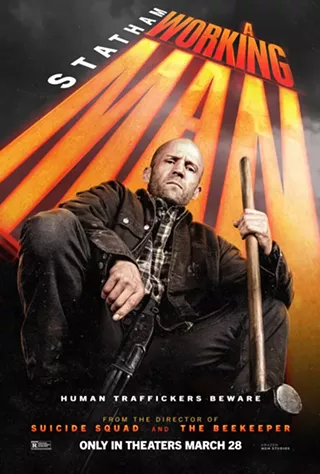What's needed is an American film that captures the Hitchcock essence, i.e., a film with a murder, a twist, at least one person who's not who he seems to be and, if the gods are smiling on us, a train.
Luckily, director Brad Anderson and writer Will Conroy (a Tucsonan, and therefore, a good person) have come up with Transsiberian, which not only has all of the above; it's also one of the best homages to the master since Brian De Palma switched to hard-core porn.
The film starts with Russian police detective Grinko (Ben Kingsley) looking at an unusual breakfast scene: A drug dealer sits at his kitchen table, apparently frozen midmeal, with a delicious knife sticking out of the back of his neck. Now, any movie that starts with Ben Kingsley and a knife in the neck is probably going to be good. But Transsiberian doesn't just coast on that opening sequence. Instead, it switches to northern China, where missionaries Roy (Woody Harrelson) and Jessie (Emily Mortimer) are getting on the trans-Siberian express, a sleeper train where they'll have Christian sex, meet some potentially dangerous drifters (Kate Mara and Eduardo Noriega) and then maybe die or kill somebody or discover a load of heroin stuffed inside vibrating erotic matryoshka dolls or just have a pleasant trip where nothing eventful happens and they deepen their marriage and learn about each other and then go home and raise kids and never discuss the matter again.
Or something. I don't want to give away the series of plot twists, reveals and clever feints that nest inside each other like, oh, I don't know, matryoshka dolls. But I assure you: It works. And you may need a little assurance, because unlike your average American film, this one features no super-powered underwear perverts, has no exploding dinosaurs and takes a while to build.
There's definitely a sense of mystery right from the start, but the general trajectory is toward ever-increasing tension, so the beginning has a deceptive calm. But this creates a powerful, rhythmic progression, such that by the end, when things become explosive, the violence and speed actually have some force to them. In this way, the film is reminiscent of American cinema from the '70s, when action sequences were saved up and used sparingly so as to preserve their effect. Films like Straw Dogs and Taxi Driver work on the same principle as Transsiberian: Establish the story; make the characters interesting; give them an independent life and an increasing set of problems and possibilities; and then unleash those possibilities only when doing so would be truly meaningful, and not simply titillating.
To that end, Mortimer effectively plays the film's central character, a bad girl who's found some degree of happiness with her eternally happy, mildly dopey husband. Harrelson, as the husband, is playing a part that he's been working ever since his days on Cheers, but that doesn't mean that he doesn't show real talent in it. In Transsiberian, he takes the basic Harrelson corn-fed everyman and gives him a naturalistic depth of feeling, replacing credulousness with a sense of wonder. That's hard to capture, and most actors go the "Simple Jack" route. Not Harrelson: His Roy seems like a real person whose happy exterior rides on top of that combination of love and fear that comes from being connected to someone who's just one step out of his league.
Kingsley is also great. This is perhaps his best performance of the year, which wouldn't mean much for most actors, but Kingsley has appeared in more than 1,400 films in the last 12 months.
While the acting is all spot-on, what makes the film work is the tight and mysterious plotting: Things that seem irrelevant turn out to be catastrophic; moments of tension and foreboding are often red herrings; and the twists pile up with violent surprise while nonetheless being completely believable and motivated by the plot.
Well, most of them. Ultimately, things get pretty over the top, but by that point, the film has earned credibility, and the explosive finale is more than worthwhile. I could toss all the credit to Anderson and Conroy on that, except that cinematographer Xavi Giménez has an unusually thoughtful approach that works perfectly with this kind of film. The camera hangs on faces that are shadowed to show age and emotion; the cramped quarters of the train are captured in claustrophobic close-up; and the Siberian wilderness is rendered in distant, crisp shots that echo with vast depth of field and wintery stillness.
I'd love for someone to give Giménez an award for this, because he does what cinematographers are supposed to do--serve the story, be informative and charm the eye with beauty and meaning--rather than what they love to do, which is show off.
With Transsiberian, we see a precise meshing of performers, script, director and imagery, and fans of the genre will be gladdened by the result.










